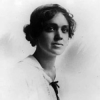Agnes Smedley

Agnes Smedley
Agnes Smedleywas an American journalist and writer, well known for her semi-autobiographical novel Daughter of Earth as well as for her sympathetic chronicling of the Communist forces in the Chinese Civil War. During World War I, she worked in the United States for the independence of India from the United Kingdom, receiving financial support from the government of Germany. Subsequently, she went to China, where she is suspected of acting as a spy for the Comintern. As the lover of...
NationalityAmerican
ProfessionAutobiographer
Date of Birth23 February 1892
CountryUnited States of America
There are many men - such as those often to be found among the Indians - who are refined until they have qualities often attributed to the female sex. Yet they are men, and strong ones.
Thousands of women are crushed and made inarticulate by that system and never develop as their natures would force them to develop were they in a decent environment.
Yet it is awful to love a person who is a torture to you. And a fascinating person who loves you and won't hear of anything but your loving him and living right by his side through all eternity!
But settled things were enemies to me and soon lost their newness and color. The unknown called.
To die would have been beautiful. But I belong to those who do not die for the sake of beauty.
But there were years when, in search of what I thought was better, nobler things I denied these, my people, and my family. I forgot the songs they sung - and most of those songs are now dead; I erased their dialect from my tongue; I was ashamed of them and their ways of life. But now - yes, I love them; they are a part of my blood; they, with all their virtues and their faults, played a great part in forming my way of looking at life.
No one yet knows what a man's province is, and how far that province, as conceived of today, is artificial.
I have no objection to a man being a man, however masculine that may be.
In the little hall leading to it was a rack holding various Socialist or radical newspapers, tracts, and pamphlets in very small print and on very bad paper. The subjects treated were technical Marxist theories.
So I had to be the doctor to these wounded men until we could remove them to the hospital. There were fifty-four women and forty little boys with the Red Army prisoners, and I went daily to take care of them also.
But I see no reason why a woman should not grow and develop in all those outlets which are suited to her nature, it matters not at all what they may be.
For the first week of the Sian events I was a first aid worker in the streets of Sian.
And the woman who could win the respect of man was often the woman who could knock him down with her bare fists and sit on him until he yelled for help.
Much that we read of Russia is imagination and desire only.